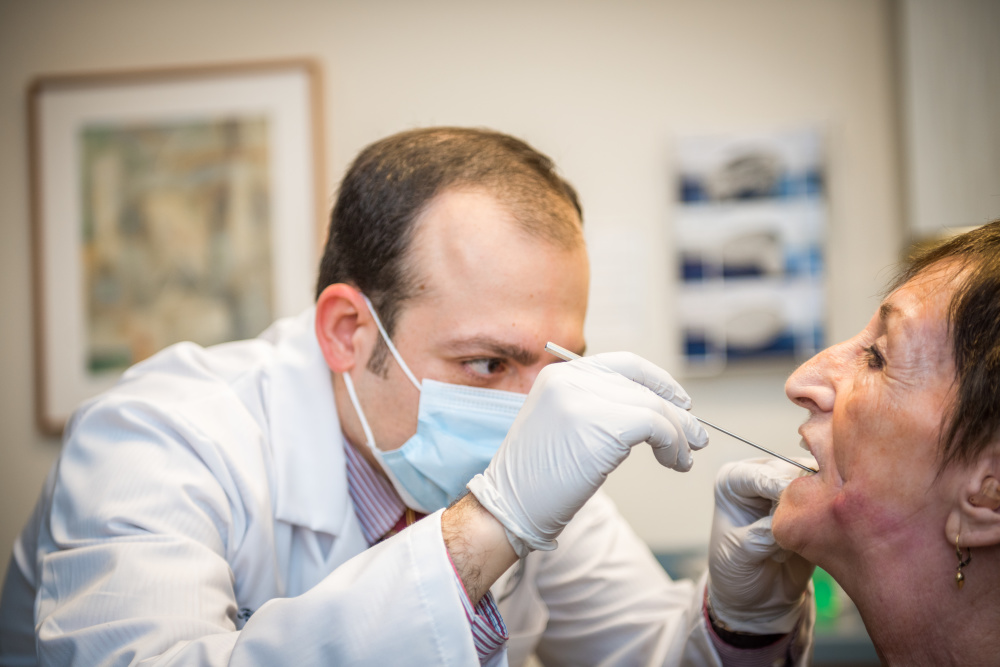When thinking of side effects of cancer treatments, nausea, fatigue and hair loss often come to mind – but what about oral health complications? Therapies that target cancer cells can also affect normal, healthy cells in the mouth and throat, and consequently, oral complications are common for cancer patients.
What is oral medicine?
Oral medicine is a dental specialty focused on the oral health care of medically complex patients, including those facing a cancer diagnosis, says Nathaniel Treister, DMD, DMSc, clinical director of Oral medicine and Oral Oncology at Dana-Farber/Brigham and Women’s Cancer Center.
What types of oral health complications can result from cancer treatment?
Patients receiving chemotherapy, radiation, or stem cell transplants may experience the following oral health side effects during or after treatment:
- Dry mouth (xerostomia)
- Distorted taste
- Difficulty eating and/or swallowing
- Oral infections
- Mouth sores and ulcers (mucositis)
- Jaw osteonecrosis
- Graft-versus-host disease, a disease that develops when the cells of the donor’s immune system attack the recipient’s normal cells and can result in painful mouth and throat ulcers
How soon can these symptoms develop?
Some complications can occur in a matter of days of starting a cancer therapy, whereas other complications may not develop until months or even years after completion of treatment, according to Treister.
Who is most commonly affected by these side effects?
Nearly all patients receiving chemotherapy, radiation or a stem cell transplant are at risk of developing oral health side effects. Patients with head and neck cancers – a group of cancers that present in the mouth, throat, larynx, sinuses, and nose – and those undergoing a stem cell transplant are at greater risk. For head and neck cancers, treatment may be targeted at the specific area where the cancer is located, therefore increasing the risk of affecting healthy cells in the mouth. Stem cell transplants require prolonged chemotherapy prior to the transplant, which also increases the likelihood that treatment-related side effects will impact the mouth. Stem cell transplants can also result in Graft-versus-host disease, which can cause mouth and throat ulcers.
What can you do to maintain good oral health?
Before starting cancer treatment, you should schedule a dental exam, including X-rays, to identify potential infections, cavities, or other issues that could worsen or create future complications. You should also pay particular attention to oral hygiene, including brushing and flossing, to help prevent cavities and infections.
During treatment, continue to practice good oral hygiene habits. You can combat and/or prevent side effects in the following ways:
Dry Mouth
- Drink at least eight glasses of water a day, keeping a water bottle close by at all times
- Avoid caffeine, alcohol, and tobacco, which can worsen dry mouth
- Brush teeth three times a day with a fluoride toothpaste, as dry mouth may cause cavities
- Chew sugar free gum
- Try moisturizing mouth sprays, artificial saliva, or other dry mouth products
- Use a cooling mist vaporizer when sleeping
Distorted Taste and Difficulty Eating and/or Swallowing
- Eat smaller meals more frequently
- Choose soft or moist foods
- Use plastic utensils to reduce metallic taste in the mouth
- Meet with a nutritionist who can help find foods and drinks that you can enjoy
Oral Infections
- Brush teeth three times a day with a fluoride toothpaste
- Floss teeth daily
- Swap mouthwash containing alcohol for warm salt water
- Schedule regular dental cleanings
Mouth Sores and Ulcers
- Ask for ice chips or sugar free popsicles to suck on during chemotherapy, which can help prevent mouth sores
- Avoid spicy foods and citrus, which may irritate mouth sores
- Talk to your doctor, who may be able to prescribe or recommend medications such as topical gels to treat mouth sores
Bleeding or Gum Sensitivity
- Use a tooth brush with extra soft bristles
- Avoid flossing when your platelet count is low, or if gums are swollen and sensitive
Following treatment, monitor your mouth for any new or worsening symptoms, and continue to regularly visit a dentist for cleanings and X-rays. If any changes or complications in your mouth concern you, consult with your care team.
Learn more about Dana-Farber’s Oral Medicine and Oral Oncology service.

